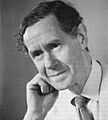J. L. Mackie facts for kids
Quick facts for kids
J. L. Mackie
|
|
|---|---|
 |
|
| Born |
John Leslie Mackie
25 August 1917 Sydney, New South Wales, Australia
|
| Died | 12 December 1981 (aged 64) Oxford, England
|
| Nationality | Australian |
| Alma mater | |
| Spouse(s) |
Joan Meredith
(m. 1947) |
| Era | 20th-century philosophy |
| Region | Western philosophy |
| School |
|
| Institutions | |
| Academic advisors | John Anderson |
|
Main interests
|
|
|
Notable ideas
|
Argument from queerness |
|
Influences
|
|
|
Influenced
|
|
John Leslie Mackie (25 August 1917 – 12 December 1981) was an important Australian philosopher. He thought deeply about big questions like religion, what reality is, and how language works. He is especially known for his ideas on metaethics, which is about the meaning of moral words like "good" or "bad."
Mackie believed that there are no "objective values." This means he thought that right and wrong are not real things that exist in the world, like trees or rocks. Instead, he argued that people invent ideas of right and wrong. His most famous book, Ethics: Inventing Right and Wrong (1977), starts by saying, "There are no objective values." He also wrote a book about arguments for and against the existence of God, called The Miracle of Theism (1983). Many people saw him as a strong supporter of atheism, which is the belief that God does not exist.
Contents
Life Story of John Mackie
John Leslie Mackie was born on August 25, 1917, in Killara, a suburb of Sydney, Australia. His father, Alexander Mackie, was a professor of education at the University of Sydney. His mother, Annie Burnett, was a schoolteacher.
John Mackie studied at the University of Sydney and finished in 1938. He then went to Oriel College, Oxford, in England, where he graduated with top honors in 1940.
During World War II, Mackie served in the army in the Middle East and Italy. After the war, he became a philosophy professor. He taught at the University of Otago in New Zealand from 1955 to 1959. Then he returned to the University of Sydney, where he taught until 1963. In 1963, he moved back to the United Kingdom. He became a professor at the University of York and later at University College, Oxford. He died in Oxford on December 12, 1981.
Mackie's Personality and Family
People said that John Mackie had a very kind way of disagreeing with others. He could tell someone he completely disagreed with them, but in such a friendly way that they might even think it was a compliment!
Mackie married Joan Meredith in 1947. They had three children. Two of their children also became philosophers. Their daughter, Penelope Mackie, taught philosophy at the University of Birmingham and later became the Head of Philosophy at the University of Nottingham. Their son, David, also teaches philosophy at Oriel College, Oxford.
Mackie's Philosophical Ideas
John Mackie is most famous for his work in three main areas: metaethics, the philosophy of religion, and metaphysics.
What is Right and Wrong?
In metaethics, Mackie was a "moral skeptic." This means he doubted that there are any truly objective (real, existing outside of us) ideas of "right" and "wrong." He argued that moral values are not like facts that everyone must agree on.
His book, Ethics: Inventing Right and Wrong, starts with the bold statement: "There are no objective values." He gave several reasons for this. He thought that moral ideas often change depending on culture or personal views. He also found it hard to imagine how "objective values" could exist in the natural world. Mackie believed that even without objective values, people would still have good reasons to believe in them. This is because believing in right and wrong helps society function.
Thoughts on God and Evil
Mackie was also well-known for defending atheism. He argued that the existence of evil and suffering in the world makes it hard to believe in an all-powerful, all-knowing, and all-good God. This is known as the "Problem of evil."

He famously wrote an essay called "Evil and Omnipotence" in 1955. In it, he said that believing in evil and an all-powerful, all-good God at the same time is "positively irrational." He argued that if God is all-powerful, God could have given humans free will and made them always choose good. So, the idea of human free will doesn't fully explain why evil exists if God is truly all-powerful and all-good.
Understanding Cause and Effect
In metaphysics, Mackie studied how things cause other things to happen. He looked at how we describe these "causal relationships." He also developed the idea of an "INUS condition." This is a condition that is an Insufficient but Necessary part of an Unnecessary but Sufficient set of conditions for something to happen. It's a complex idea about how different factors combine to cause an event.
Mackie also had a debate with other philosophers about Richard Dawkins's book, The Selfish Gene. Mackie thought the ideas in the book could help explain moral philosophy.
Images for kids
See also
 In Spanish: John Leslie Mackie para niños
In Spanish: John Leslie Mackie para niños
 | Roy Wilkins |
 | John Lewis |
 | Linda Carol Brown |


